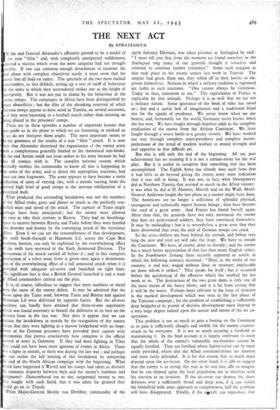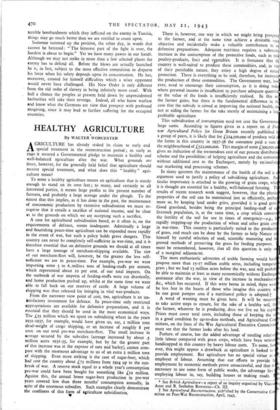THE NEXT ACT
By STRATEGICUS N the end General Alexander's offensive proved to be a model of
the true " blitz " and, with completely unexpected suddenness, thieved a success which even the most sanguine had not thought issible. If one can summon enough detachment to examine the sal phase with complete objectivity surely it must seem that the nemy lost all hold on sanity. The spectacle of the two most exalted ,mmanders, in this debacle, setting up a sort of tariff of behaviour or the units to which they surrendered strikes one as the height of ncongruity. But it was not put to shame by the behaviour of the nemy troops. The campaigns in Africa have been distinguished lay my absurdities ; but the elite of the shrinking reservoir of select erman troops appear to have acted in Tunisia, on several occasions, if they were hastening to a football match rather than insisting on eing placed in the prisoners' camps.
There are in these episodes a number of important lessons that ay guide us in the phase to which we are hastening, or mislead us we do not interpret them aright. The most important seems to the greatness of the results of a true " blitz " attack. It is now ear that Alexander destroyed the organisation cf the enemy army ith a completeness generally limited to the theoretical text-books. t the end Arnim could not issue orders to his army because he had ost all contact with it. The complex nervous system which ormally enables the commander to know all that is happening in e units of the army, and to direct the appropriate reactions, had en cut into fragments. The army appears to have become a mere ollection of units of varying size, with a morale varying from the ormal high level of good troops to the nervous exhilaration of a vsterical mob.
What produced this astounding breakdown was not the numbers the Allied tanks, guns and planes so much as the perfectly con- rolled mass and speed of the attack. The capture of Tunis might rhaps have been anticipated ; but the enemy were allowed
o time to take their stations in Bizerta. They had no breathing- pace to recover between Bizerta and Tunis before they were hustled nto disorder and dismay by the converging attack of the victorious lies. Even if we can see the reasonableness of that development, he swift break-through at Harrunam Lif, across the Cape Bon uthern bastion, can only be explained by the overwhelming effect the swift turn eastward of the Sixth, Armoured Division. The omentum of the attack carried all before it ; and in this complete estruction of a select army there is given once again a demonstra- ion of the overwhelming effect of a full armoured attack when it is ovided with adequate air-cover and launched on right lines. e significant fact is that a British General launched it and a team Allied commanderi carried out the plan.
It is, of course, ridiculous to suggest that mere numbers or metal ere the cause of the enemy defeat. It may be admitted that the lows upon the Tunis road, between Tunis and Bizerta and against ammam Lif were delivered by superior forces. But the all-over umbers can hardly have attained that three-to-one superiority hich was found necessary to breach the defensive at its best on the estern front in the last war. Nor does it appear that we can xplain the breakdown in morale by the recognition of the enemy oops that they were fighting in a narrow bridgehead with no hope. ome of the German prisoners have provided their captors with nfortnation that proves conclusively how complete is the official ontrol of news in Germany. If they had been fighting in Tibet ey could not have been more ignorant of events in Africa. There as a lapse in morale, as there was during the last war ; and perhaps
e can realise the full bearing of this breakdown by comparing
e end of the North African campaign with the beginning. What ,ould have happened if Wavell and his troops had taken as decisive
e immense disparity between their and the enemy's numbers and uipment? Outnumbered ten to one, outgunned twenty to one, ey fought with such finish that it was taken for granted they ould go on to Tripoli.
When Major-General Moritz von Drebber, commander of the
297th Infantry Division, was taken prisoner at Stalingrad he .said: " I must tell you that from the moment we found ourselves in the Stalingrad ring many of our generals thought it' senseless and criminal to continue further resistance." Some such reaction as that took place in the enemy armies last week in Tunisia. The umpire had given them out, they rolled off in their lorries to im- prison themselves. Nations in which a military tradition is ingrained are liable to such reactions. " One cannot always be victorious. Today to thee, tomorrow to me." The capitulation of France is explicable by that attitude. Perhaps it is as well that we are not a military nation. Some ignorance of the book of rules has saved us ; that and 2 useful lack of imagination and a traditional blind eye for the signals of prudence. We never know when we are beaten, and, fortunately for the world, Germany never knows when she has won. We have fought through hopeless odds to the complete eradication of the enemy from the African Continent. We have fought through a worse battle to% greater victory. We have worked our way through complete unpreparedness and complete incom- prehension of the trend of modern warfare to armed strength and real expertise in that difficult art.
But this is still only the end of the beginning. All our past achievement has no meaning if it is not a curtain-raiser for the real play. But it is useful to recognise that something real has been accomplished. The Eighth Army has already won such fame that it had little to do beyond giving the enemy army some indication • that it was still in being. It was not, in fact, what Montgomery did in Northern Tunisia that assisted so much in the Allied victory : it was what he did at El Alamein, Mareth and on the Wadi Akarit. General Anderson fought the last phase as a master might have done. The Americans are no longer a collection of splendid physical, courageous and technically expert human beings ; they have become the seed of a great army. And France has found herself again. More than that, the generals have not only convinced the enemy that they are professional soldiers, they have convinced themselves. It may be misleading ; but it is nevertheless a great asset that they have discovered that even the pick of German troops can crack.
So the scene-shifters are busy behind the curtain, and before very long the new and vital act will take the stage. We have to invade the Continent. We have, of course, done so already ; and the enemy has a much better appreciation of that fact than many English critics. In the Frankfurter Zeitung there recently appeared an article in which the following sentence occurred : " Here, in the midst of our country, is real war, waged without limit or measure, implacable on those whom it strikes." That speaks for itself ; but it occurred before the quickening of the offensive which has marked the last week or so. The destruction of the two great dams is only one of the most recent of the heavy blows, and it is far from certain that it will be the worst. Perhaps more relevant to the issue of invasion is the marked development which was seen in the last phase of the Tunisian campaign ; for the problem of establishing a sufficiently deep bridgehead to permit of decisive development must depend to a very large degree indeed upon the nature and extent of the air co- operation.
This problem is not so much to gain a footing on the Continent as to gain it sufficiently cheaply and swiftly for the enemy counter- attack to be overcome. It is not so much securing a foothold as maintaining it. In the final account it is largely irrelevant to insist that the whole of the enemy's vulnerable sea-frontiers cannot be equally fortified. They are fortified where fighter-cover can be most easily provided, where also the Allied communications are shortest and most easily defended. It is for this reason that so much must depend upon the air-factor. On the other hand, it is idle •to suggest that the enemy is as strong this year as he was last, idle to imagine that he can depend upon the local population not to interfere with his reaction to an invasion. if the air-cover can destroy the shore defences over a sufficiently broad and deep area, if it can isolate the battlefield with some approach to completeness, half the problem will have disappeared. Finally, if the aircraft can reproduce that terrible bombardment which they inflicted on the enemy in Tunisia, things may go much better than we are entitled to count upon.
Someone summed up the position, the other day, in words that cannot be bettered : " The bitterest part of the fight is over, the hardest is about to begin." Yet we have many pawns in our hands. Although we may not strike in more than a few selected places the enemy has to defend all. Before the blows are actually launched he is, in fact, subject to the most effective compulsion to disperse his force when his safety depends upon its concentration. He has, moreover, created for himself difficulties which a wiser opponent would never have challenged. His New Order is only different ' from the old order of slavery in being infinitely more cruel. With half a chance the peoples at present held down by unprecedented barbarities will take their revenge. Indeed, all who know warfare and know what the Germans are view that prospect with profound misgiving, since it may lead to further suffering for the occupied countries.



























 Previous page
Previous page